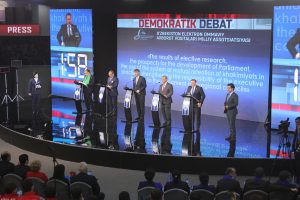Following the March 6 approval by the Cabinet of Ministers of Uzbekistan for Tashkent to apply to the Eurasian Economic Union (EAEU) as an observer, last week the Parliament of Uzbekistan began deliberations on the issue to give its final approval. Only a few months ago, the parties in parliament uniformly supported Uzbekistan’s EAEU membership, not to mention observer status, which allows participation in meetings but provides no economic benefits or obligations. In light of the apparent blanket approval across the parties, smooth discussions and unanimous approval were expected.
In December, Uzbekistan held parliamentary elections that, despite much hype and significant differences from past electoral contests, resulted in largely the same balance of pro-government parties as the 2014 election.
But this past week, lawmakers voiced economic and political concerns regarding Uzbekistan’s potential membership in the EAEU. It was as if they received a green light to speak their opinions freely.
The Social Democratic Party, Adolat, spoke about a potential $2 billion loss to Uzbek industry as a result of EAEU membership. A deputy from the Democratic Party of Uzbekistan or Milliy Tiklanish, Farkhod Zayniev brought up the same statistic and added that about 100,000 jobs will be lost. Other concerns raised up by Adolat included the lack of independent coordinating power in foreign trade of the EAEU member states, weak enforcement of regulations that govern EAEU members, inconsistent application of regulations to settle disputes, and the fact that Russia, the largest member, remains under international sanctions.
Individual deputies, all from Adolat and all women, expressed concerns as well. Gulbahor Saidganieva asked whether the government of Uzbekistan attempted to study Moldova’s (the only EAEU observer state) experience over the past two years and how Uzbekistan’s eventual membership would affect investments from China, South Korea, and other countries. Her other concerns were the tendency of smaller member countries to acquiesce to the terms of the leading country (clearly hinting at Russia), high fluctuations in currency values of member countries and their effect on Uzbekistan, and loss of interest in foreign investments to Uzbekistan as a result of economic sanctions levied against Russia.
Mahfirat Khushvaktova spoke about other negative aspects of membership. First, she highlighted, high tariffs for products entering from non-EAEU countries could impede 361 existing foreign investment projects valued at $63 billion. Second, she expressed concern that Uzbekistan would turn into a lucrative market for other EAEU members rather than the EAEU countries becoming markets for Uzbekistan.
Dilrabo Kholboeva continued the list of economic concerns, including unequal terms for the EAEU member countries, the increase of meat prices, and the financial burden that would lay on Uzbekistan to prepare its infrastructure for EAEU standards. Kholboeva spoke in favor of Uzbekistan pursing membership in the World Trade Organization (WTO) first, and then think about EAEU membership.
The above concerns were largely unanticipated given that in December 2019 the same political parties expressed unilateral support and did not voice opposition to Uzbekistan’s membership in EAEU when asked by Russian Ambassador to Uzbekistan Vladimir Tyunderev at a special pre-parliamentary election briefing.
The government’s plan to become a EAEU member is written into its Concept of Social and Economic Development of Uzbekistan – 2030, and the negotiation process for membership is supposed to start in 2022 and complete with membership in 2025. There is plenty of time for the government to chart a course toward membership and a lot can change along the way. It is unclear how much the opinions of the parties and individual members can influence the government’s determined path.
Approval of Uzbekistan’s observer status from various parties started trickling in and in the end, the parliament will most likely approve the government’s request for observer status. That said, a previously nonexistent debate among officials about the economic and political risks to Uzbekistan as a result of EAEU membership is emerging. Most importantly, it is a sign that these discussions are moving beyond the confines of the economic realm. A wave of concerns will balance overly positive opinions espoused over the past several months and counter the government’s determined position to enter the EAEU.

































